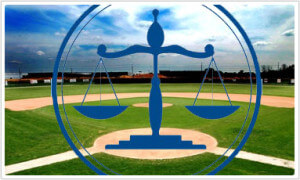 If you are a fan of the movie Moneyball or simply love keeping track of and comparing sports statistics, a career in sports analytics may be for you. If you also dream of being consulted as an expert and called on to prepare reports or testify in major litigation, sports law analytics is the field you want. How do you get a job in sports law analytics? You must love math and commit to at least six years of school. Though comparing sports statistics is as old as the first Athenian Olympics, sports analytics is a relatively new academic field. Since it is an emerging area of study, the path to a career in sports analytics can start from many places, according to Analytics Magazine.
If you are a fan of the movie Moneyball or simply love keeping track of and comparing sports statistics, a career in sports analytics may be for you. If you also dream of being consulted as an expert and called on to prepare reports or testify in major litigation, sports law analytics is the field you want. How do you get a job in sports law analytics? You must love math and commit to at least six years of school. Though comparing sports statistics is as old as the first Athenian Olympics, sports analytics is a relatively new academic field. Since it is an emerging area of study, the path to a career in sports analytics can start from many places, according to Analytics Magazine.
Undergraduate Education for A Career In Sports Law Analytics
For a job in sports analytics, a student must have a very strong grasp of statistics. The best majors to provide that education are mathematics, economics, and physics. A passion for statistics isn’t the only component, though. A student must have a good understanding of how sports statistics influence each other. A dual degree or a minor in sports management can sharpen the skills necessary to advance to the next step, a graduate education, according to StatTrak.
Graduate Education for A Career In Sports Law Analytics
In order to work in sports law analytics, you must have more than an undergraduate degree. Expert witnesses in high-stakes trials must be able to prove that they are leading experts in the field. A master’s degree, at the very least, is required. Litigation often features two different sports analytics experts who give conflicting testimony. In weighing which one of the experts is more credible and experienced, a doctorate in a sports analytics-related field would likely give one expert the edge over another who holds only a master’s degree.
Some universities offer courses in sports analytics at the graduate level through their Masters of Business Administration programs. Other universities have specialized Masters of Sports Administration, or MSA, programs that prepare a student for a career in sports analytics. There are also universities that offer no specified courses in sports analytics, but the skills taught by their statistics-focused master’s programs will prepare students for further study. Ph.D’s in mathematics, statistics, or even computer science may be the best path to a career as an expert in analytics.
Work and Publication After Graduation
Since there is not currently one accepted educational path to becoming a sports analytics expert, the research papers, articles, and books that an aspiring expert publishes are particularly important to that person being considered an expert in the field. It may be vital to maintain a strong social media presence with other sports analytics professionals or to connect to a journalist who can popularize an emerging expert’s ideas, according to the MIT Sloan Sports Analytics Conference.
Testifying As An Expert Witness In Sports Law Analytics
A sports law analytics expert does more than testify in court before a judge or jury. More than half of all civil litigation ends in a settlement between the parties involved instead of a trial. Sports law analytics experts are vital to settlement, because the reports that they prepare for the attorneys who hire them to give an opinion shape the case. Expert witnesses often testify about their qualifications and reports without ever setting foot inside a courtroom. Before trial, attorneys take depositions, recorded statements under oath which are like a dress rehearsal for testimony that will be given at trial.
Related Resource: Director of Sports Management
It’s not enough to love sports statistics get a jobs in sports law analytics. The jobs are only available to people who have dedicated many years to undergraduate and graduate-level study of sports analytics. Even then, to be able to testify as a compelling expert witness one must be recognized as a leader in the field of sports analytics.
Related Resources: